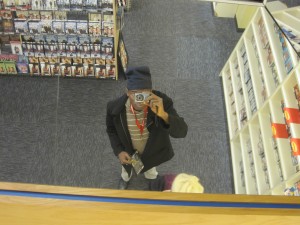An update coming right up…
 One thing I never quite understood when I first landed here was the extent of choice available to the shopper. Why, I wondered, were there sooooo many things to buy. My first attempt to buy toothpaste almost ended in a disaster when I stood there in the aisle for minutes trying to decide if I preferred Colgate Total Advanced Whitening, Colgate Total Advanced Fresh, Colgate Total Advanced Clean or Colgate Whitening Oxygen Bubbles, which are real Colgate products for your information. (Read the entry here). How do these people make their choice, I had wondered, and concluded within myself that they didn’t really put their mind to it. They probably just went into the store, picked one out of a hundred beckoning choices, and left. I have discovered how wrong I was in that assumption. A few days before Christmas, Papa Rudy and I had gone to shop for groceries and his wife had stressed more than three times on the phone that what we had to buy for food was small red beans. SMALL RED, she stressed, and I wondered what difference it could make to make such a distinction. When we got to the aisle for vegetables, I found out why. There were green beans, red beans, small red, canned green, baked beans, baked beans in chilli, etc. We got her the small red, but when I ate it later as part of the dinner, I still couldn’t tell what was different about it than the other kind of beans I’d eaten before, so I decided that maybe it was a good idea that women did the cooking in the homes because I could never imagine the kind of argument that might have ensued all night if he had done the cooking with his own preferable choice of beans. For sure, she wouldn’t have liked it.
One thing I never quite understood when I first landed here was the extent of choice available to the shopper. Why, I wondered, were there sooooo many things to buy. My first attempt to buy toothpaste almost ended in a disaster when I stood there in the aisle for minutes trying to decide if I preferred Colgate Total Advanced Whitening, Colgate Total Advanced Fresh, Colgate Total Advanced Clean or Colgate Whitening Oxygen Bubbles, which are real Colgate products for your information. (Read the entry here). How do these people make their choice, I had wondered, and concluded within myself that they didn’t really put their mind to it. They probably just went into the store, picked one out of a hundred beckoning choices, and left. I have discovered how wrong I was in that assumption. A few days before Christmas, Papa Rudy and I had gone to shop for groceries and his wife had stressed more than three times on the phone that what we had to buy for food was small red beans. SMALL RED, she stressed, and I wondered what difference it could make to make such a distinction. When we got to the aisle for vegetables, I found out why. There were green beans, red beans, small red, canned green, baked beans, baked beans in chilli, etc. We got her the small red, but when I ate it later as part of the dinner, I still couldn’t tell what was different about it than the other kind of beans I’d eaten before, so I decided that maybe it was a good idea that women did the cooking in the homes because I could never imagine the kind of argument that might have ensued all night if he had done the cooking with his own preferable choice of beans. For sure, she wouldn’t have liked it.
 In the olden days when I used to go shopping at Walmart and Aldi with Reham the Egyptian, I never quite understood why she spent so much time shopping. The pattern always repeated itself: she would agree with me, nodding to my every word right before entering the store, that “at around 5.25pm, we must both be done shopping, and must proceed to check-out no matter what we’re doing, do you understand? The bus to campus is scheduled to be here at 5.30pm and I will hate to miss it. We’re clear, right? Look at your watch, it’s 4.30pm right now,” and she would say “Yes, yes, I understand.” By a quarter to six, when the bus would have long left, leaving us behind, I would be sitting at the exit door, angry and out of my wits, wondering why in the world I had to deserve that kind of torture. She would come out later and say “Oh I’m sorry. What do you want me to do when I couldn’t find what I wanted?” Couldn’t she have just asked an attendant? No, she would rather look at everything, spending quality time to decide if she wanted the extra large, jumbo size or the family size, among many other variables. Hmmm… I don’t have to tell you why it’s been such a long time since we both went out shopping anymore. 🙂
In the olden days when I used to go shopping at Walmart and Aldi with Reham the Egyptian, I never quite understood why she spent so much time shopping. The pattern always repeated itself: she would agree with me, nodding to my every word right before entering the store, that “at around 5.25pm, we must both be done shopping, and must proceed to check-out no matter what we’re doing, do you understand? The bus to campus is scheduled to be here at 5.30pm and I will hate to miss it. We’re clear, right? Look at your watch, it’s 4.30pm right now,” and she would say “Yes, yes, I understand.” By a quarter to six, when the bus would have long left, leaving us behind, I would be sitting at the exit door, angry and out of my wits, wondering why in the world I had to deserve that kind of torture. She would come out later and say “Oh I’m sorry. What do you want me to do when I couldn’t find what I wanted?” Couldn’t she have just asked an attendant? No, she would rather look at everything, spending quality time to decide if she wanted the extra large, jumbo size or the family size, among many other variables. Hmmm… I don’t have to tell you why it’s been such a long time since we both went out shopping anymore. 🙂
 But being such a brisk shopper has not altogether being without its disadvantages for me as well. The first time I made such a brisk purchase was at the Reagan Airport in Washington DC, and I was lucky because it was just for gum – Orbit, I believe. I never even knew until then that there were so many kinds of flavour. I took the one that looked the finest, and regretted it afterwards because it was also the harshest in the mouth, and I had bought three. But I can’t blame brisk shopping for that, since it isn’t possible to have a taste of it beforehand anyway. So far, let me just say that I believe in my guts when it comes to making a choice out of a horde of beckoning options. I may sometimes regret it – as was the case with the impostor potatoes, or the winter jacket I got at Khol’s that almost didn’t fit me again when I got back home – but mostly, I’ve had much success. Even if not, I’d still take that over missing the bus and keeping myself in the harsh evening cold for far longer than necessary.
But being such a brisk shopper has not altogether being without its disadvantages for me as well. The first time I made such a brisk purchase was at the Reagan Airport in Washington DC, and I was lucky because it was just for gum – Orbit, I believe. I never even knew until then that there were so many kinds of flavour. I took the one that looked the finest, and regretted it afterwards because it was also the harshest in the mouth, and I had bought three. But I can’t blame brisk shopping for that, since it isn’t possible to have a taste of it beforehand anyway. So far, let me just say that I believe in my guts when it comes to making a choice out of a horde of beckoning options. I may sometimes regret it – as was the case with the impostor potatoes, or the winter jacket I got at Khol’s that almost didn’t fit me again when I got back home – but mostly, I’ve had much success. Even if not, I’d still take that over missing the bus and keeping myself in the harsh evening cold for far longer than necessary.
Take that Reham! 😉 🙂 :D.
Q: How do I prepare for teaching class, usually?
A: I don’t.
 Well, that’s not true, technically. It’s just a short response. I spend all waking hours, especially at weekends usually mentally mapping the format of the next class that by the time it’s Saturday evening, I’m in an almost panic mode, worrying whether I’ve done enough even though I’ve been noting things down and recalling examples that could help pass the messages across better. But I don’t study much just for the class. I follow relevant links that I find online or offline, and I follow up on new and old leads. Yesterday I looked through the first chapters of Je Ká Ka Yoruba, the text for the language teaching again, and tried to see if there was something there that I hadn’t seen before or taught before. I needed to cover much of the weekly syllabus because of the Martin Luther King holiday that fell on Monday, effectively reducing my week by half.
Well, that’s not true, technically. It’s just a short response. I spend all waking hours, especially at weekends usually mentally mapping the format of the next class that by the time it’s Saturday evening, I’m in an almost panic mode, worrying whether I’ve done enough even though I’ve been noting things down and recalling examples that could help pass the messages across better. But I don’t study much just for the class. I follow relevant links that I find online or offline, and I follow up on new and old leads. Yesterday I looked through the first chapters of Je Ká Ka Yoruba, the text for the language teaching again, and tried to see if there was something there that I hadn’t seen before or taught before. I needed to cover much of the weekly syllabus because of the Martin Luther King holiday that fell on Monday, effectively reducing my week by half.
Before I went to bed at 3am on Sunday night, I managed to read the first chapter of A Mouth Sweeter Than Salt for the very first time in one sitting. Last semester, I had only just glanced through that chapter because I had too much to read then. I got much of the ideas of it from the students’ summaries and what we discussed in class. Lazy, I know. But after reading it yesterday, I understood why anyone could be forgiven for trying to avoid reading it. For an avid reader, each sentence is a treasure of lore. It tells of some thing or the other that the author has either not talked about before earlier, or that he wants to say again in another way. I agree, the chapter could have been a little shorter, but you should read it. You should read it. It brings memories of things parents talk about. Reading it, I felt like I was listening to a seasoned elder speak of his childhood in a closely knit extended Yoruba family. If I could meet the writer, I would ask him too many questions. Or I would just sit at his feet, just listening to him talk. He is a good writer. He’s a good story teller too. Why is this book not read in Nigerian schools? Oh, I forgot, Wole Soyinka’s Ake has already taken control of that spot in autobiographical narratives in colonial and pre-colonial Nigeria. Their experiences are not the same, but they are similar, as I pointed out in class, lest they get the idea that everyone of us in Nigeria – just like this writer – do not know our exact date of birth. Alright, go and get the book, and read.
There is nothing new I want to tell you about today’s class. It stated on time and it ended on time. No other student has dropped off beside Gretchen who had dropped out after a first class. She left us for a class in Finance, so we’re nineteen now. Still, the textbooks are not sufficient. Many will have to share. We can’t complain. Now we can greet, introduce ourselves, respond in Yoruba and ask few introductory questions in Yoruba as well. It’s a start. These students are more agile, a little faster to learn than the last ones. I think. I could be wrong. They got the “kp” and “gb” far easily, for sure. Maybe it is because of the size of the class that gives this positive feeling and active participation. It is turning out to be a blessing after all. We may not be able to joke around as much as we did last semester, but we will try. I may find it harder to learn everyone’s names on time as I want to. It will take a while, but I’ll get there. Today we met esu, ifa, Obatala, and Sango. Next week, we’re meeting Wole Soyinka, and maybe later Suzanne Wenger. Maybe it’s not a bad idea to have such a large class. It feels warm enough. I love it.
I think that the most memorable thing I have found as a pattern is that I usually wake up early whenever I have to teach a class, notwithstanding when I go to bed. It’s a good thing. Maybe that’s why I’m tired on Thursdays…
A Swiss guy visiting Sydney, Australia, pulls up at a bus stop where two locals are waiting. “Entschuldigung, koennen Sie Deutsch sprechen?” he asks.
The two Aussies just stare at him.
“Excusez-moi, parlez vous Francais?” he tries.
The two continue to stare.
“Parlare Italiano?”
No response.
“Hablan ustedes Espanol?”
Still nothing.
The Swiss guy drives off, extremely disgusted. The first Aussie turns to the second and says, “Y’know, maybe we should learn a foreign language.”
“Why?” says the other. “That guy knew four languages, and it didn’t do him any good.”

